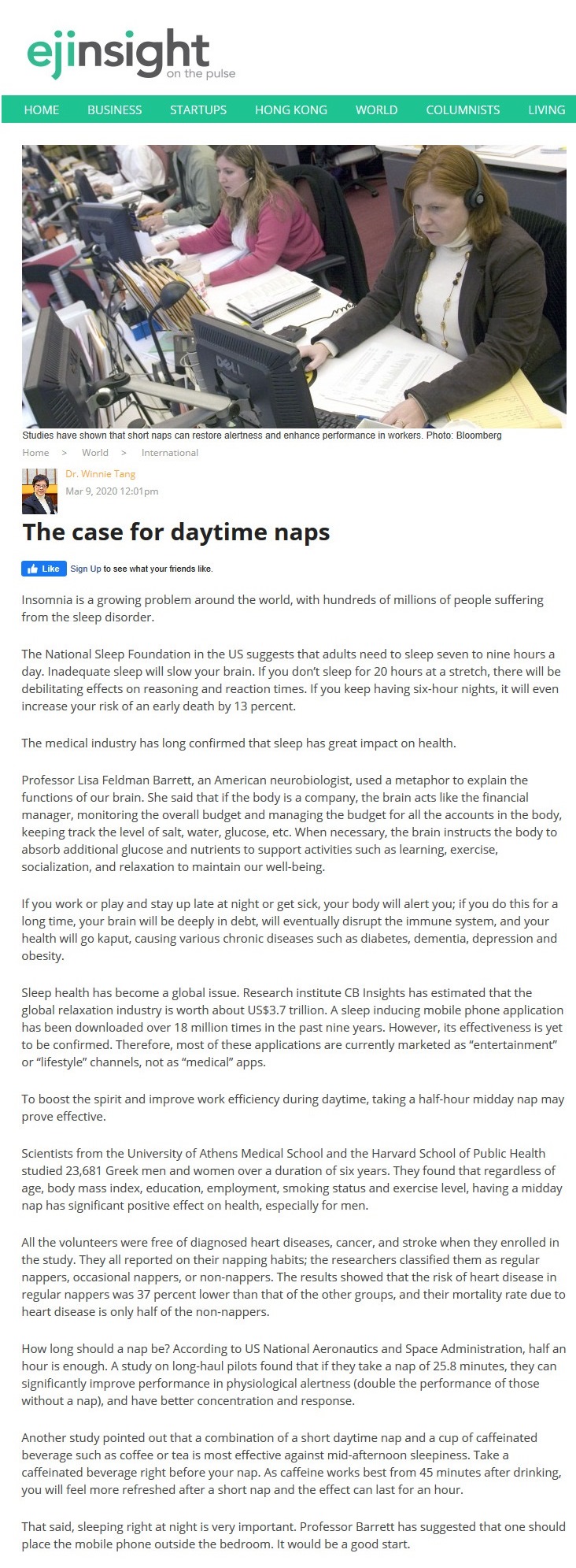網上版請按此

The case for daytime naps
Insomnia is a growing problem around the world, with hundreds of millions of people suffering from the sleep disorder.
The National Sleep Foundation in the US suggests that adults need to sleep seven to nine hours a day. Inadequate sleep will slow your brain. If you don't sleep for 20 hours at a stretch, there will be debilitating effects on reasoning and reaction times. If you keep having six-hour nights, it will even increase your risk of an early death by 13 percent.
The medical industry has long confirmed that sleep has great impact on health.
Professor Lisa Feldman Barrett, an American neurobiologist, used a metaphor to explain the functions of our brain. She said that if the body is a company, the brain acts like the financial manager, monitoring the overall budget and managing the budget for all the accounts in the body, keeping track the level of salt, water, glucose, etc. When necessary, the brain instructs the body to absorb additional glucose and nutrients to support activities such as learning, exercise, socialization, and relaxation to maintain our well-being.
If you work or play and stay up late at night or get sick, your body will alert you; if you do this for a long time, your brain will be deeply in debt, will eventually disrupt the immune system, and your health will go kaput, causing various chronic diseases such as diabetes, dementia, depression and obesity.
Sleep health has become a global issue. Research institute CB Insights has estimated that the global relaxation industry is worth about US$3.7 trillion. A sleep inducing mobile phone application has been downloaded over 18 million times in the past nine years. However, its effectiveness is yet to be confirmed. Therefore, most of these applications are currently marketed as "entertainment" or "lifestyle" channels, not as "medical" apps.
To boost the spirit and improve work efficiency during daytime, taking a half-hour midday nap may prove effective.
Scientists from the University of Athens Medical School and the Harvard School of Public Health studied 23,681 Greek men and women over a duration of six years. They found that regardless of age, body mass index, education, employment, smoking status and exercise level, having a midday nap has significant positive effect on health, especially for men.
All the volunteers were free of diagnosed heart diseases, cancer, and stroke when they enrolled in the study. They all reported on their napping habits; the researchers classified them as regular nappers, occasional nappers, or non-nappers. The results showed that the risk of heart disease in regular nappers was 37 percent lower than that of the other groups, and their mortality rate due to heart disease is only half of the non-nappers.
How long should a nap be? According to US National Aeronautics and Space Administration, half an hour is enough. A study on long-haul pilots found that if they take a nap of 25.8 minutes, they can significantly improve performance in physiological alertness (double the performance of those without a nap), and have better concentration and response.
Another study pointed out that a combination of a short daytime nap and a cup of caffeinated beverage such as coffee or tea is most effective against mid-afternoon sleepiness. Take a caffeinated beverage right before your nap. As caffeine works best from 45 minutes after drinking, you will feel more refreshed after a short nap and the effect can last for an hour.
That said, sleeping right at night is very important. Professor Barrett has suggested that one should place the mobile phone outside the bedroom. It would be a good start.
Dr. Winnie Tang
Adjunct Professor, Department of Computer Science, Faculty of Engineering and Faculty of Architecture, The University of Hong Kong